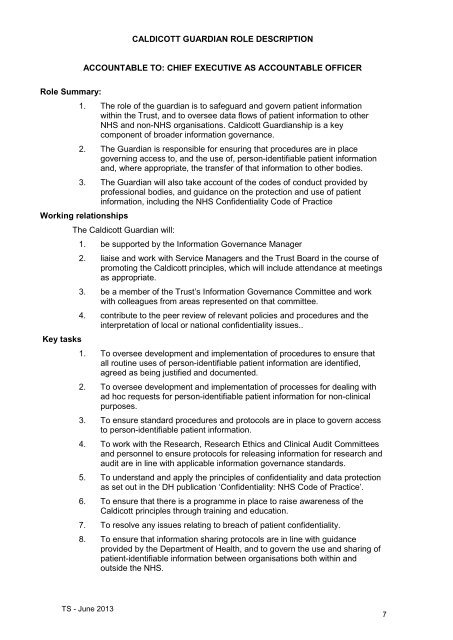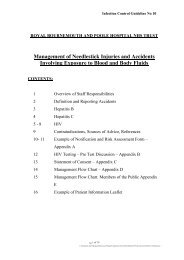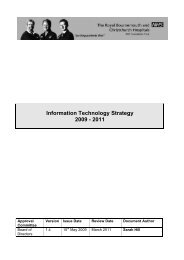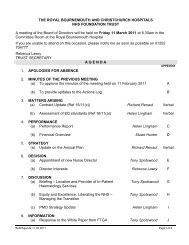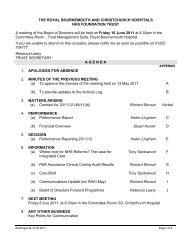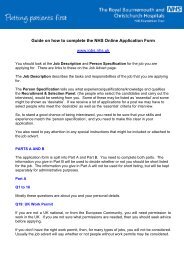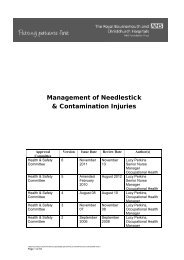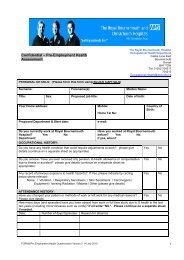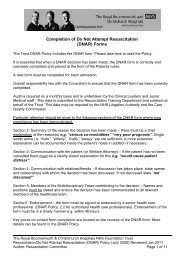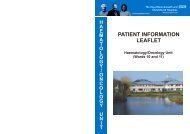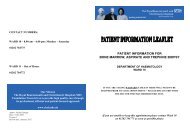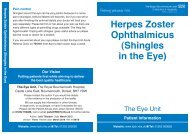A G E N D A 1. APOLOGIES FOR ABSENCE Ian Metcalfe 2 ...
A G E N D A 1. APOLOGIES FOR ABSENCE Ian Metcalfe 2 ...
A G E N D A 1. APOLOGIES FOR ABSENCE Ian Metcalfe 2 ...
Create successful ePaper yourself
Turn your PDF publications into a flip-book with our unique Google optimized e-Paper software.
CALDICOTT GUARDIAN ROLE DESCRIPTIONACCOUNTABLE TO: CHIEF EXECUTIVE AS ACCOUNTABLE OFFICERRole Summary:<strong>1.</strong> The role of the guardian is to safeguard and govern patient informationwithin the Trust, and to oversee data flows of patient information to otherNHS and non-NHS organisations. Caldicott Guardianship is a keycomponent of broader information governance.2. The Guardian is responsible for ensuring that procedures are in placegoverning access to, and the use of, person-identifiable patient informationand, where appropriate, the transfer of that information to other bodies.3. The Guardian will also take account of the codes of conduct provided byprofessional bodies, and guidance on the protection and use of patientinformation, including the NHS Confidentiality Code of PracticeWorking relationshipsKey tasksThe Caldicott Guardian will:<strong>1.</strong> be supported by the Information Governance Manager2. liaise and work with Service Managers and the Trust Board in the course ofpromoting the Caldicott principles, which will include attendance at meetingsas appropriate.3. be a member of the Trust’s Information Governance Committee and workwith colleagues from areas represented on that committee.4. contribute to the peer review of relevant policies and procedures and theinterpretation of local or national confidentiality issues..<strong>1.</strong> To oversee development and implementation of procedures to ensure thatall routine uses of person-identifiable patient information are identified,agreed as being justified and documented.2. To oversee development and implementation of processes for dealing withad hoc requests for person-identifiable patient information for non-clinicalpurposes.3. To ensure standard procedures and protocols are in place to govern accessto person-identifiable patient information.4. To work with the Research, Research Ethics and Clinical Audit Committeesand personnel to ensure protocols for releasing information for research andaudit are in line with applicable information governance standards.5. To understand and apply the principles of confidentiality and data protectionas set out in the DH publication ‘Confidentiality: NHS Code of Practice’.6. To ensure that there is a programme in place to raise awareness of theCaldicott principles through training and education.7. To resolve any issues relating to breach of patient confidentiality.8. To ensure that information sharing protocols are in line with guidanceprovided by the Department of Health, and to govern the use and sharing ofpatient-identifiable information between organisations both within andoutside the NHS.TS - June 20137


